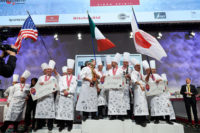![]()
Chilton Takes the Reigns
By Ann Przybyla Wilkes
SFA VP of Communications
Nick Chilton became Chairman of the Snack Food Association's Board of Directors earlier this month. He has been president of Wyandot, Inc. since December 1994. Yet he has prepared for the challenges and responsibilities of leadership all of his life.
Born in 1946 in Amarillo, Texas, Chilton enjoyed his childhood. His dad owned a successful truck stop on Route 66 for 25 years, until after World War II and the advent of cut-rate gas. After that Chilton's father entered the real estate field and moved the family to Glenwood Spring, Colorado, and shortly thereafter to Southern California.
Chilton attended college at California State College at Fullerton (Cal State Fullerton), where he was elected student body president. At that time, Orange County, where Cal State Fullerton is located, was extremely conservative politically. The school, however, was politically moderate. The clash between the university system and state government resulted in Chilton working with the state government on a number of issues that provided excellent leadership training.
Chilton graduated with a B.A. degree in Communications, with an emphasis in technical writing. He went to work for Procter & Gamble as a brand assistant on Puffs facial tissues. Shortly after moving to Cincinnati, Chilton married his high school sweetheart, Martha Waters, in February 1969.
A few years later, Chilton and his wife returned to California where he went to work for Clorox Co., which had recently been divested from P&G. Over the next few years, Chilton held a number of positions with increasing responsibility and new challenges. The companies he worked for included the Grocery Store Products Co., West Chester, Pa.; Shaklee, a laddered sales marketing organization based in Calif.; and Labatt's Beer Co., Canada's major beer manufacturer.
While working for Labatt's, Chilton went to Eugene, Oregon to start a grocery products division, Oregon Farms, Inc., where he identified small frozen food brands that the company could purchase and grow. "It was a fun company, and I loved working there," Chilton remembers.
The next position Chilton took was vice president of business development over acquisitions, divestures and strategies for Johnson Outdoors, Inc., Racine, Wisc., the only public company aligned with the Johnson family of the S.C. Johnson Wax Company. However, the company soon was decentralized and Chilton's position was eliminated. At that point, Chilton went to Elliot Life Raft, a commercial life raft company belonging to Johnson Outdoors in Palm Beach, Fla. to sell the company. Once the sale was complete, Chilton began searching for another position.
From its founding in 1936 through the early 1990's, Wyandot, Inc. had always been a family-owned and managed company. Warren Brown and his brothers, George and Dave, were second-generation owners. Through research, they learned that there was a high failure rate in the second and third generations of family businesses. Therefore, the Browns had formed a Board of Directors tilted towards outside, non-family members. The Board had a total of seven members, with the three brothers as the only family members.
Until Warren Brown joined the business in the late 1950s, Wyandot solely produced and sold popcorn. He saw an opportunity to make corn-based snacks and provide regional chippers with additional products to compete with larger companies. Brown spied a niche and grew the company nicely in the '60s through the '80s by contract manufacturing.
"It was a brilliant strategy," Chilton acknowledges.
Wyandot Hires First Outside President
In the early 1990s, Wyandot's Board for the first time decided to look outside for a leader to run the company. In 1994, Nick Chilton became the first non-family member hired to run the company, partly because of his experience in organizational management.
Several things that Chilton considered before accepting the position were that he and his wife liked small towns and he preferred running a small- to medium-size company rather than working with a large corporate staff. Chilton explains, "I like to know all the staff and to be involved in all aspects of the business."
During 1995 and 1996, Warren Brown and Chilton developed and executed the transition of Wyandot from a family-run company to one with outside leadership. Explaining the transition process, Chilton emphasizes, "Warren was so intelligent; he could be extremely objective during the process. Yet his strength was as an entrepreneur."
Once Chilton took over running the company, Brown never said "no" to him. Sometimes he would say, "I think you're making a mistake," and Chilton had enough respect to listen. By the end of 1996, Brown had removed himself from active management of the company.
On November 1, 1996, an electrical fire destroyed Wyandot's production capability (see SF/WB, March 2003, p. 18). When the plant was rebuilt after the fire, key factors were to provide maximum flexibility and speed.
"Flexibility is the key to our survival," according to Chilton, explaining that the company works on 2,000 SKUs every two to three weeks. Since insurance paid for rebuilding the Marion plant, the company was able to make similar technological improvements to its Jeffersonville, Inc. plant, so it was equally modern.
In 1997, Wyandot's Board of Directors was expanded to nine. However, the number of positions held by family members remained at three. Each of the founder's three sons has a son who sits on the Board. Other board members include Chilton, and five outside people all chosen for their skill sets.
"It is an absolute joy to work with Wyandot's Board of Directors. Warren's vision of a privately owned, publicly managed company is a reality," says Chilton.
Chilton describes his management style as: optimal communication to produce optimal productivity, which will produce optimal business results. He adds that communication is vital. "The right people need the right information at the right time," stresses Chilton.
In addition to good communication with employees, Chilton says he tries to create an atmosphere in which reasonable mistakes are expected and that people don't have to fear admitting them. He wants his employees to be able to say, "I've made a mistake, let's all get together and figure how to fix it."
Wyandot's President's Operation Committee meets every two weeks. It is made up of senior management who advise Chilton. The meetings consist of healthy (not confrontational) debate. Most of the time consensus emerges. If not, Chilton makes a decision and everyone is expected to get on board.
Chilton is active in public service, which fits in with the Brown family values. After 25 years of volunteer service to the Boy Scouts of America, he was awarded the Silver Beaver Award in February 2004 by the Heart of Ohio Council of the Boy Scouts of America. This is one of the highest awards that a Council can confer upon an adult volunteer. Chilton is currently president of the Heart of Ohio Council, which covers nine counties and 16,000 boys. Chilton says that he supports scouting because it strengthen families and helps boys become good citizens.
Chilton has been Chairman of the Chamber of Commerce, a member of the United Way Board, and President of the local Rotary Club. In addition, he lectures to Red Cross groups on disaster recovery and insurance settlement. In his free time, Chilton enjoys golf and writing. He has had several business articles published.
Vision for SFA
When asked about the challenges that the Snack Food Association faces, Chilton is quick to point out that the changes in the packaged goods industry over the last five to six years are greater than in the previous 30 years. The phenomenal rate of change in the packaged goods industry has been driven by the consolidation of retailers. It is also driven by the enormous size of Wal-Mart, which has led to the consolidation of manufacturers.
Another issue that SFA faces is that we exist in an age of incredible information flow, which facilitates and causes change. "We're in uncharted waters," Chilton notes, adding that these changes affect the way we do business, and that new products are introduced quicker now. Other issues that SFA needs to address are obesity, acrylamide and trans fatty acids.
Chilton is aware of the challenges to the association. SFA is experiencing a fundamental shift from family owned businesses to a new generation of owners and big company participants, Chilton explains. This results in changing expectations of SFA members, he adds. As Chairman of the Board, he wants to continue on the path the Board and staff have followed the last few years and to maximize service to members.




